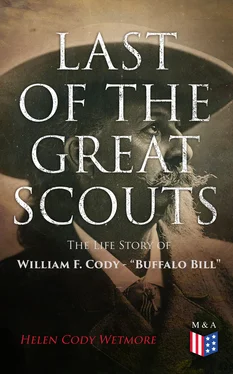When Will opened his eyes they fell upon the most interesting object that the world just then could offer him—an Indian!
The "noble red man," as he has been poetically termed by people who have but known him from afar, was in the act of mounting Will's horse, while near by stood his own, a miserable, scrawny beast.
Will's boyish dreams were now a reality; he looked upon his first Indian. Here, too, was a "buck"—not a graceful, vanishing deer, but a dirty redskin, who seemingly was in some hurry to be gone. Without a trace of "buck fever," Will jumped up, rifle in hand, and demanded:
"Here, what are you doing with my horse?"
The Indian regarded the lad with contemptuous composure.
"Me swap horses with paleface boy," said he.
The red man was fully armed, and Will did not know whether his father and the guide were within call or not; but to suffer the Indian to ride away with Uncle Elijah's fine horse was to forfeit his father's confidence and shake his mother's and sisters' belief in the family hero; so he put a bold face upon the matter, and remarked carelessly, as if discussing a genuine transaction:
"No; I won't swap."
"Paleface boy fool!" returned the Indian, serenely.
Now this was scarcely the main point at issue, so Will contented himself with replying, quietly but firmly:
"You cannot take my horse."
The Indian condescended to temporize. "Paleface horse no good," said he.
"Good enough for me," replied Will, smiling despite the gravity of the situation. The Indian shone rather as a liar than a judge of horseflesh. "Good enough for me; so you can take your old rack of bones and go."
Much to Will's surprise, the red man dropped the rein, flung himself upon his own pony, and made off. And down fell "Lo the poor Indian" from the exalted niche that he had filled in Will's esteem, for while it was bad in a copper hero to steal horses, it was worse to flee from a boy not yet in his teens. But a few moments later Lo went back to his lofty pedestal, for Will heard the guide's voice, and realized that it was the sight of a man, and not the threats of a boy, that had sent the Indian about his business—if he had any.
The guide had returned to escort Will to the spot which father, after a search of nearly a week, had discovered, and where he had decided to locate our home. It was in Salt Creek Valley, a fertile blue-grass region, sheltered by an amphitheater range of hills. The old Salt Lake trail traversed this valley. There were at this time two great highways of Western travel, the Santa Fe and the Salt Lake trails; later the Oregon trail came into prominence. Of these the oldest and most historic was the Santa Fe trail, the route followed by explorers three hundred years ago. It had been used by Indian tribes from time, to white men, immemorial. At the beginning of this century it was first used as an artery of commerce. Over it Zebulon Pike made his well-known Western trip, and from it radiated his explorations. The trail lay some distance south of Leavenworth. It ran westward, dipping slightly to the south until the Arkansas River was reached; then, following the course of this stream to Bent's Fort, it crossed the river and turned sharply to the south. It went through Raton Pass, and below Las Vegas it turned west to Santa Fe.
Exploration along the line of the Salt Lake trail began also with this century. It became a beaten highway at the time of the Mormon exodus from Nauvoo to their present place of abode. The trail crossed the Missouri River at Leavenworth, and ran northerly to the Platte, touching that stream at Fort Kearny. With a few variations it paralleled the Platte to its junction with the Sweetwater, and left this river valley to run through South Pass to big Sandy Creek, turning south to follow this little stream. At Fort Bridger it turned westward again, passed Echo Canon, and a few miles farther on ran into Salt Lake City. Over this trail journeyed thousands of gold-hunters toward California, hopeful and high-spirited on the westerly way, disappointed and depressed, the large majority of them, on the back track. Freighting outfits, cattle trains, emigrants—nearly all the western travel—followed this track across the new land. A man named Rively, with the gift of grasping the advantage of location, had obtained permission to establish a trading-post on this trail three miles beyond the Missouri, and as proximity to this depot of supplies was a manifest convenience, father's selection of a claim only two miles distant was a wise one.
The Kansas-Nebraska Bill, which provided for the organizing of those two territories and opened them for settlement, was passed in May. 1854. This bill directly opposed the Missouri Compromise, which restricted slavery to all territory south of 36'0 30" north latitude. A clause in the new bill provided that the settlers should decide for themselves whether the new territories were to be free or slave states. Already hundreds of settlers were camped upon the banks of the Missouri, waiting the passage of the bill before entering and acquiring possession of the land. Across the curtain of the night ran a broad ribbon of dancing camp-fires, stretching for miles along the bank of the river.
None too soon had father fixed upon his claim. The act allowing settlers to enter was passed in less than a week afterward. Besides the pioneers intending actual settlement, a great rush was made into the territories by members of both political parties. These became the gladiators, with Kansas the arena, for a bitter, bloody contest between those desiring and those opposing the extension of slave territory.
Having already decided upon his location, father was among the first, after the bill was passed, to file a claim and procure the necessary papers, and shortly afterward he had a transient abiding-place prepared for us. Whatever mother may have thought of the one-roomed cabin, whose chinks let in the sun by day and the moon and stars by night, and whose carpet was nature's greenest velvet, life in it was a perennial picnic for the children. Meantime father was at work on our permanent home, and before the summer fled we were domiciled in a large double-log house—rough and primitive, but solid and comfort-breeding.
This same autumn held an episode so deeply graven in my memory that time has not blurred a dine of it. Jane, our faithful maid of all work, who went with us to our Western home, had little time to play the governess. Household duties claimed her every waking hour, as mother was delicate, and the family a large one; so Turk officiated as both guardian and playmate of the children.
One golden September day Eliza and I set out after wild flowers, accompanied by Turk and mother's caution not to stray too far, as wild beasts, 'twas said, lurked in the neighboring forest; but the prettiest flowers were always just beyond, and we wandered afield until we reached a fringe of timber half a mile from the house, where we tarried under the trees. Meantime mother grew alarmed, and Will was dispatched after the absent tots.
Turk, as we recalled, had sought to put a check upon our wanderings, and when we entered the woods his restlessness increased. Suddenly he began to paw up the carpet of dry leaves, and a few moments later the shrill scream of a panther echoed through the forest aisles.
Eliza was barely six years old, and I was not yet four. We clung to each other in voiceless terror. Then from afar came a familiar whistle—Will's call to his dog. That heartened us, babes as we were, for was not our brother our reliance in every emergency? Rescue was at hand; but Turk continued tearing up the leaves, after signaling his master with a loud bark. Then, pulling at our dresses, he indicated the refuge he had dug for us. Here we lay down, and the dog covered us with the leaves, dragging to the heap, as a further screen, a large dead branch. Then, with the heart of a lion, he put himself on guard.
Читать дальше












